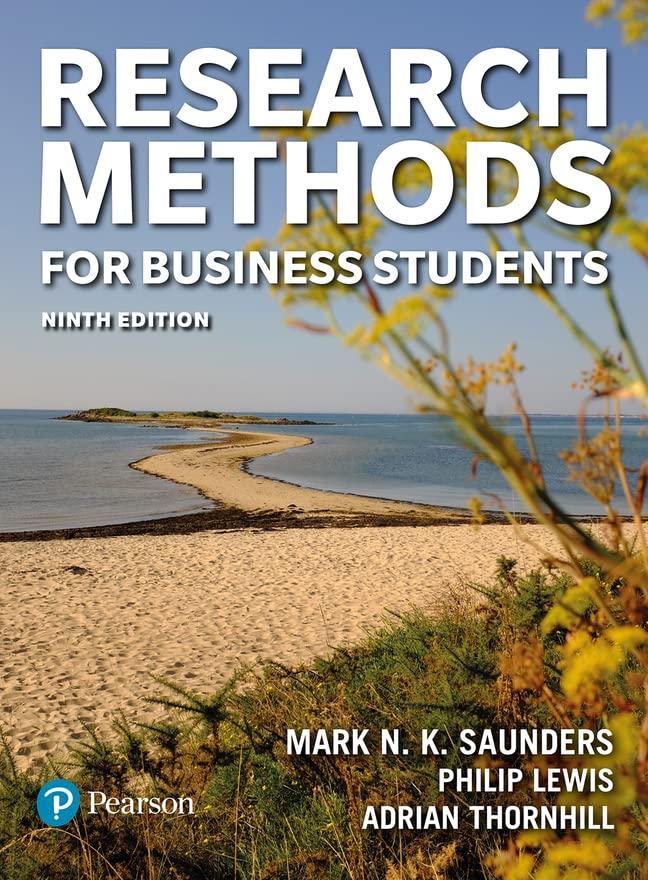Yu Yan is studying for a Masters in Human Resource Management and is keen to focus upon
Question:
Yu Yan is studying for a Masters in Human Resource Management and is keen to focus upon work-life conflict in her research project. She has studied the literature and is intrigued by the cultural assumptions that underpin what she considers to be more westernised views of work- life balance. Yu Yan is from a Chinese background and her view is that as the literature suggests (Xiao and Cooke 2012), work-life conflicts in China are treated more as facts of life that one has to deal with, rather than challenges that individuals, families and organisations should strive to resolve, a more typical view in the literature on Western organisations (Radcliffe and Cassell 2014). Yu Yan is keen to investigate her hunch that the experiences of Chinese and UK families are different. In her research methods course she has been excited by more qualitative methods of research, where there is the opportunity to ask people directly about their experiences. She is keen to find out the types of work-life conflicts people experience and how they deal with them.

Yu Yan has read about the use of face-to-face interviews and diary studies (Radcliffe and Cassell 2014) in accessing the daily experiences of work-life conflict and balance. However, the recent Covid pandemic has made her concerned about face-to-face interviews and she is keen to collect qualitative data by other means. Her research suggests that one way of accessing such data is by audio or video diary studies where informants are asked to record their views regularly (Whiting et al. 2018; Crozier and Cassell 2016). In preparing to discuss the choice of methods with her project tutor, Yu Yan decides to undertake a pilot study on some of her fellow students. She asks two of her friends to record their views at two times each day, at midday and again at 6 p.m. They are asked to answer the ques- tion 'What work-life conflicts did you experience?' and 'How did you manage them?" In describing her pilot data to her project tutor, she expresses a concern that the data collected may not be as insightful as it could be, indeed she had expected a little more commentary in the recordings. Addi- tionally, she is uncertain about what to do about the non-verbal aspects of the video data collected. for example should she be focusing on analysing gestures and facial expressions? Her project tutor suggests two ways of addressing these concerns. First, given that Yu Yan wants to know about how people deal with work-life conflict, she does not necessarily need visual data. Therefore, an audio diary may be more appropriate. Second, the formal questions that Yu Yan asked may have put too much structure on the data collection process and that a more free-flowing method of data collec- tion led by the participants may be more appropriate. She suggests to Yu Yan that studies that have used video or audio diaries have used clear instructions to encourage the 'digital diarist' (Whiting et al. 2018) to talk about what is important to them as and when it is convenient. After the meeting with her project tutor, Yu Yan is excited and optimistic about her project. From her family and friendship networks and through snowball sampling she has already found 20 people who are ready to record their views on their mobile phones and send their accounts back to her. Half of these people come from Chinese backgrounds, so she is hoping to be able to make some comparative conclusions about different approaches to work-life conflict. Yu Yan has asked the 20 diarists to record their data over a two-week period. She decides to leave them in peace while they do the task, and she works on her literature review. Four weeks later, she contacts her participants asking that they submit their diary entries to her so she can start to analyse the data. As she prepares for her next meeting with her project tutor where she will give an overview of the data she has collected, she is disappointed to find that there is little consistency in the data. Some participants have made plenty of recordings, but they are outside of the two-week period. Some have made very little with three participants admitting that they forgot to record anything. She is worried that some of the participants say that they don't think that they have experienced any examples of work-life conflict during the period and therefore haven't recorded anything. Yu Yan is feeling downhearted when she meets with her project tutor. Her project tutor re-assures her that she has enough data to write a very interesting dissertation, but perhaps there are things she can learn from the experience about the methodological approach she has used. In seeking to ensure that participants provided lots of free-flowing data, Yu Yan may not have provided enough structure for her participants.
Questions
1 One of the challenges that Yu Yan faced was that of attrition, that participants who had agreed to participate did not complete their audio diaries. What could she have done to ensure that they engaged with the research?
2 Yu Yan found that the data she collected was very different for different participants. How could she have ensured that there was more consistency in the data collected?
3 What advice would you have given Yu Yan about planning her research study, and what she might have done differently?
Step by Step Answer:

Research Methods For Business Students
ISBN: 9781292402727
9th Edition
Authors: Mark Saunders, Philip Lewis, Adrian Thornhill





